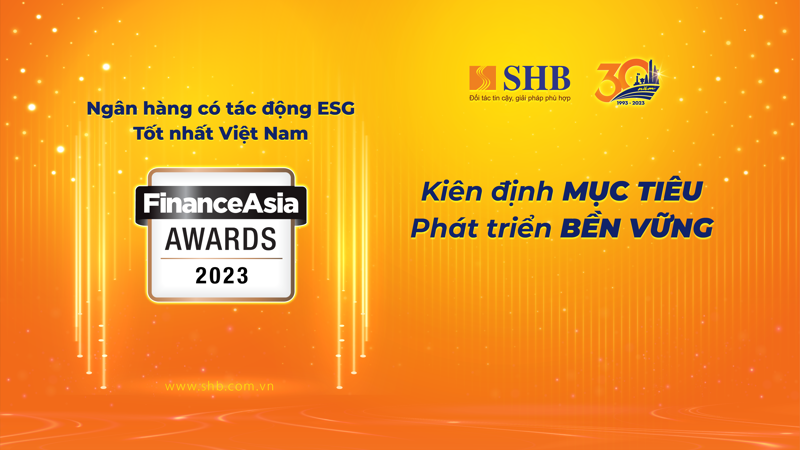ESG and sustainable development trends
Environmental, social, governance (ESG) is a set of standards to measure factors related to the sustainable development of an enterprise. It provides a common framework for examining the environmental and social impact and dependencies of a business, as well as the quality of its own governance.
It is a relatively new concept, and since Vietnam made strong commitments at COP26 as well as the rapid movement of the international market towards the trend of sustainable and responsible business, it has become a mainstream trend that many domestic enterprises are interested in, aiming at safe development and improving prestige and competitiveness during deep integration. It is also an important factor in helping attract foreign strategic investors.
The fact that SHB was honored with the award once again affirms the direction of the bank in its safe, effective, and sustainable development strategy, which has been highly appreciated by international organizations.
Green credit growth in SHB’s overall development strategy
With a positive impact related to the environment, SHB identifies green credit growth as an important part of its overall strategy. Its green growth action plan is implemented synchronously under a specific roadmap, from raising awareness among staff, partners, and customers about the importance of green credit to developing credit products and banking services for green sectors.
Simultaneously, SHB has gradually transformed its credit structure towards giving priority to customers engaged in production and business activities in green fields, contributing to encouraging borrowers to convert projects and loan purpose to environmentally-friendly projects.
The bank has implemented outstanding projects in green credit, such as participating in the disbursement of nearly VND1 trillion ($42.33 million) in the Vietnam Renewable Energy Development Program (REDP) project funded by World Bank (WB) through green energy projects, and serving and on-lending to the “Smart Grid - Efficiency in Power Transmission” (phase 1) project worth €65 million ($70.26 million) and the “Effective grid in small and medium cities” (phases 1 and 2) project worth €350 million ($378.35 million), funded by the German Government through the Kreditanstalt für Wiederaufbau (KfW) Bank.
SHB was also the issuing bank guaranteeing participating banks in providing credit to the Promoting Savings in Vietnam’s Industries (VSUEE) project funded by the Green Climate Fund (GCF) and entrusted through the World Bank (WB) and the Ministry of Industry and Trade (MoIT) with a total value of $75 million, as well as other typical green projects.
Thanks to synchronous development strategies, the proportion of green credit loans at SHB accounts for nearly 10 per cent of total outstanding loans and is growing, boosting efficiency and contributing to sustainable growth and environmental protection.

Priority for female-owned businesses
FinanceAsia greatly appreciates and recognizes SHB’s efforts in community responsibility projects, for example the program on supporting women-owned businesses to reduce the impact of Covid-19, funded by the Asian Development Bank (ADB). As of the end of 2022, SHB was the leader among five banks participating in the project, with total non-refundable aid of $1.7 million withdrawn from the ADB to directly support customers.
Women-owned businesses facing difficulties due to Covid-19 have received support under many policies from SHB and the ADB, such as free loan structure and interest support, and funding commitment fees for capital withdrawal and exempting or reducing all related fees, among others. The value of such support totals up to $10,000, taken from ADB’s funding. At the same time, SHB also offers incentives such as exempting and reducing certain service fees for businesses participating in the program.
Not only providing financial support, SHB also cooperates with the ADB to organize training courses and consulting programs to improve corporate governance skills, thereby enhancing competitiveness and sustainable development.
In early 2023, SHB signed a credit cooperation contract with the International Finance Corporation (IFC) worth $120 million to develop a loan portfolio for small and medium-sized enterprises (SMEs), with priority given to women-owned businesses and those participating in supply chains. SHB committed to setting aside a minimum of 37.5 per cent of the loan value to lend to women-owned businesses, and the bank will receive a grant of $226,000 from the Women Entrepreneurs Finance Initiative (We-Fi) and the Women Entrepreneurs Opportunity Facility (WEOF); global funding initiatives with the goal of expanding access to capital for women entrepreneurs.
Promoting operational efficiency, complying with international standards
Towards the goal of improving operational efficiency and sustainable development, corporate governance and system improvement are indispensable parts of SHB’s operations. In March 2023, together with the credit contract between SHB and the IFC, with a loan package of $120 million, IFC and its partners in the program will accompany and advise SHB in developing business strategies contributing to improving governance capacity and risk management according to international standards.
Focusing on human development, in which attracting talent is one of the four main pillars (Attracting talent; Institutional reform, mechanisms, regulations, and processes; Customer-centricity; and IT Platforms and Transformation) is a priority pursued by SHB’s Board of Directors in the bank’s operations.
Over the past time, the senior staff of SHB have also been strengthened, with the election of additional members of the Board of Directors, and attracting and appointing senior personnel with extensive experience in strategy and digital technology and previously holding important positions at leading domestic and international prestigious financial institutions.
SHB also strongly invests in training activities, building a creative and dynamic corporate culture to create a happy working environment and promote employee productivity. As a result, SHB’s business and operating targets have both increased impressively in the past few years despite facing many challenges in the market.
The banking sector plays an important role in leading the economy by providing and coordinating capital resources based on a strict risk assessment process and possessing high-quality human resources. Therefore, SHB expects that the pioneering implementation of ESG will not only help the bank develop safely and effectively and improve its reputation, but also contribute to creating a boost for the economy in setting new standards for sustainable development.









 Google translate
Google translate